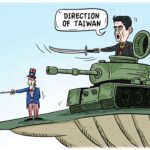An LGBT (lesbian, gay, bisexual, and transgender) organization in China – LGBT Rights Advocacy China – recently announced it has ceased all activities and shut down its social media accounts. This soon caught the attention of Western media outlets, which spared no effort in hyping the case, stirring up contradictions among Chinese people.
For instance, the Associated Press reported in early November the news with the headline, “China LGBT rights group shuts down amid hostile environment.” The Australian Broadcasting Corporation claimed on November 29, “China’s LGBTIQ+ movement is under attack. But international support can be a double-edged sword.”
Those Western reports tend to stress the “suppression” or “crackdown” the LGBTQI+ (people who have identified themselves as LGBT, questioning or intersex) groups in China face, claiming, “Most of the time LGBTIQ+ groups come into conflict with the authorities, it’s because they’re seen as a political threat.”
The truth is, those media outlets know very well what the issue is all about. They do not really care about the group, but rather treat it as a tool to infiltrate China, pushing their values like the so-called human rights in China. Some foreign political forces have been playing tricks over issues like feminism, AIDS, animal protection, and so on. LGBTQI has become their latest contrivance.
Controversies over the above-mentioned topics do exist and there is room for improvement in China. But what the foreign forces have been doing is cultivating their own version of the so-called civil society in China.
LGBT Rights Advocacy China was established in 2013, without being registered with the relevant authorities. It became well known since one of its members surnamed Peng checked himself into a private clinic to investigate the clinic’s “electroshock treatments” on homosexuality. He sued the hospital over forced conversion therapy and won the lawsuit. Later, China banned electric shock therapy in public and private hospitals.
It shows that being LGBTQI is not illegal in China and the government is making efforts to promote the rights of relevant people. The situation of the group is different across the world. Take the US. Despite the Supreme Court’s landmark 2015 ruling, which made same-sex marriage the universal law of the country, “states across US still cling to outdated gay marriage bans,” US National Broadcasting Company reported in 2020. How come the US feels so entitled to accuse China over the case, when it has its own problems to fix?
As long as the foreign forces which support LGBTQI groups in China respect China’s sovereignty and the rule of law, China will surely have their back. There will be no problem as long as the foreign forces which support LGBTQI groups in China respect China’s sovereignty and the rule of law. Unfortunately, those foreign forces often have ulterior motives. Imagine if the LGBTQI groups in the West are supported by other forces which aim at overthrowing the capitalist system, will the countries turn a blind eye to them?
It is like how Western countries distinguish immigrants between legal and illegal. They claim people have rights and freedom to migrate. In that case, is their regulation on illegal migrants violating those people’s human rights? If not, how could they accuse China’s moves to deal with illegal civil groups as violating human rights, especially when some groups have already become forces that destabilize the social stability?
The West should take care of its own affairs before pointing fingers at China. And they should be careful not to habitually politicize social issues, cozying up to certain groups too much and intensifying contradictions. Otherwise, they will only cause greater social injustice, triggering fierce counterattacks by right-wing populists.


